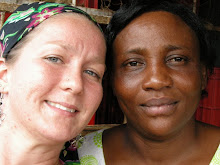(and a few more pictures!)
February 7, 2010 7:57am
It has been a busy week. I am finally on my feet – doing projects – teaching in the village. My first projects include teaching Life Skills classes at the primary and secondary schools (in Swahili, of course) teaching self-formed small groups permaculture gardening and nutrition, teaching disease prevention seminars at the dispensary, and working with the Village Water Committee to address our dire water situation. I also hope to get the permaculture garden at the primary school back on its feet and plant seeds in the next week or so as the rains are coming!!
I have my hands full, but as I work into a routine it will become less difficult. My villagers are excited about my projects, and excited to learn new things, I know that I am lucky in this. Many other volunteers face lack of interest and ambition in their projects from their villagers, people not showing up for meetings, classes, or project implementation. My village is the opposite – showing up at seminars asking if I can teach more about different things next time!
I began my teaching in the secondary school on Thursday of last week. I was very nervous going into it, never having taught in a school before, not being used to kids, the disciplinary structure, and of course – I would have to teach in Kiswahili. But luckily, I had no choice but to plow through it. I put on a fearless smile, and walked in and started. I told them we were learning together and when they laughed at my Kiswahili mistakes I laughed with them. I taught 2 classes in the secondary school, each with approximately 140 students. I didn’t know the amount of students (despite repeatedly asking) before my lesson, so when I walked into the classroom to see the sea of faces staring up at me squeezed into every space possible in the small classroom, I was pretty overwhelmed. But what can you do except begin?
And despite the complicated metaphors within the first lesson, they grabbed the concepts quickly, and the lessons that follow I think they will really enjoy. The Life Skills manual is a fantastic and easy to use tool, and it breaks down a lot of the lessons into hands on games, role play, and interactive lessons. I will have to figure out how to work with such a huge group, but I know they are willing and excited to learn – and where there is a will – there is a way.
Teaching at the primary school was a little more hit and miss. In the primary school I co-taught the class with a fellow teacher knowing that there was going to be even more of a communication difficulty getting across ideas to these younger children. Also, because the primary school is not so desperately strapped for teachers, it was actually an option, unlike the secondary school. The complication more arose from the lack of the teacher’s understanding (despite me sitting down with him and going over the lesson step by step a few times) of the meaning and content intended. In the future, I might end up wanting to teach that class myself, although the little voice in the back of my head reminds me of the unsustainability of this idea. Over time I am hoping he will understand more completely himself the ideas and skills we are teaching through the life skills lessons.
In the primary school I taught standard 7 students ranging from 13 to 15 years old. While most volunteers choose to teach only in the secondary schools, this year in my village only 4 students out of 48 passed the standard 7 exams which allowed them to go on to form 1 (secondary school). Those other 44 students are at the end of their educational careers. A statistical majority of students who pass the standard 7 exams don’t have the money to pay the school fees necessary to attend secondary school anyway. The very luckiest might somehow be able to find funding to go to trainings to learn skills as tailors, mechanics, furniture makers, or otherwise, but the vast majority will farm with their families while looking to start families of their own. (this is another project that I am working towards beginning - some sort of sustainable affordable apprenticeship program or school)
It feels good, rewarding, and exhausting, to finally be getting work done in the village. There is so much to do – so many things I can do – and damn – my Swahili is GOOD!
Sunday, February 7, 2010
Subscribe to:
Comments (Atom)






